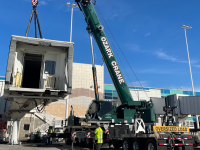Aug 24 2009
Over the weekend the Springfield paper printed a letter written by a citizen who is concerned about the airport’s new fire station. The writer objects to the fact that the airport just built a new fire station at a cost of $4.5 million. He thinks the “pension commission should take note that there might be extra funds at the airport available for the pension.”
Before addressing his concerns, let’s provide some sorely needed perspective and background.
The city of Springfield runs a retirement fund for Springfield firefighters and police officers. The fund is under funded. As a result, the city is working to bring funding up to snuff. As part of the process to identify a solution, a “pension commission” was formed. Its mission: identify possible solutions to pension funding. Numerous remedies have been discussed, including cuts in city services, and the addition of new taxes.
The issue has a lot of people on edge. Understandably so—especially with talk of new taxes during an economic downturn. It’s against this background that the letter writer brings up the new airport fire station. His point simply put: could the fire house construction money have been used to fund the retirement pension?
There’s a problem with this idea: it’s illegal, under federal law, for the city to dip into airport funds.
Here’s how it works—think of it as a financial fire wall between city finances and airport finances. It prevents the city from using airport funds.
Why would the feds want a fire wall? Because it views airports as national resources whose financial interest must be protected. Or, to put it bluntly, the feds don’t want cities raiding airport coffers. Airports generate revenue (a tempting target). They are also very expensive to keep up and their infrastructure is worth millions of dollars. They have to maintain large reserve funds to deal with unexpected emergencies. In short, if a city raids airport funding, it could jeopardize the airport and the national air system. That’s why the fire wall is there.
The fire wall is one reason why the city can’t use airport funds, but there’s a second reason: the airport does not receive money from the city. The airport has to pay for itself. Here’s how it works…
The airport (meaning the land and facilities) is owned by the city. The airport is managed by an independent 11-member administrative board. When I say “independent,” here’s what I mean: acting as an independent body, the board plans, develops, operates and maintains existing and future airport properties, and the overall management of employees.
Airport Board members are appointed by the city manager, with confirmation made by the city council. The board operates the airport as a self-supporting enterprise function.
Enterprise funds are used widely across the country—here’s how the Minnesota Department of Administration defines it: "A type of proprietary fund that is established to account for operations financed and operated in a manner similar to private business enterprises (i.e. water, gas, and electric utilities; parking garages; transit systems; or airports). For enterprise funds, the governing body intends that the costs of providing goods and services (i.e. operating expenses, including depreciation), to the general public on a continuing basis should be financed or recovered primarily through user charges."
Here’s how it works at our airport: daily operations are funded by money generated from leases and contracts with the airlines and other businesses using airport facilities. Money from the Federal Aviation Administration (FAA) is received on a matching basis for the funding of qualifying improvement projects. Federal funding is mainly generated by federal taxes on airline tickets, aviation fuel and cargo shipments.
Here’s the bottom line: no money comes to the airport from the city. In fact, the airport pays the city for the following services: human resources, purchasing, finance and law. With the exception of these city services, which the airport pays for, all money generated by the airport must stay at the airport. It would be illegal, under federal law, to send the money elsewhere.
Hope that all makes sense. We understand some people may not like it—we’re just trying to explain how it works. Questions? Please ask!


